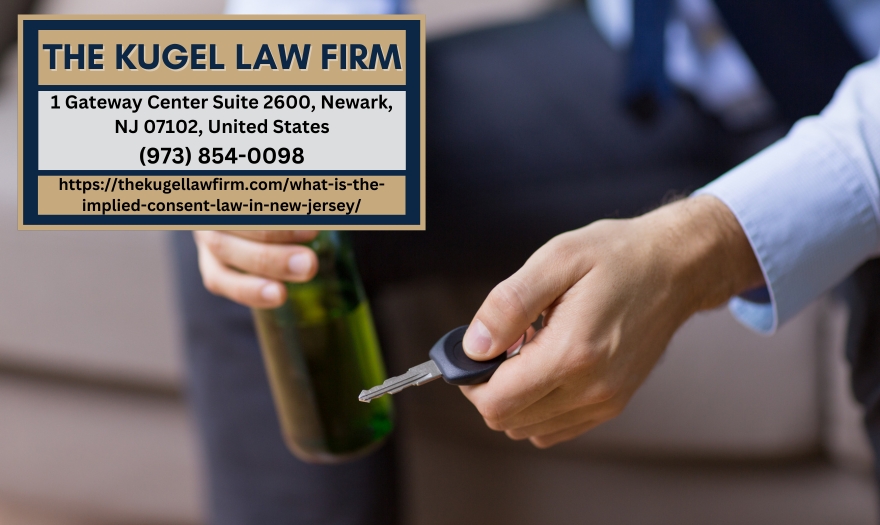Understanding the implications of New Jersey’s Implied Consent Law is essential for any driver facing DUI-related charges. As a New Jersey DUI lawyer, Rachel Kugel (https://thekugellawfirm.com/what-is-the-implied-consent-law-in-new-jersey/) of The Kugel Law Firm offers crucial insights into how this law impacts drivers and what legal consequences may follow a refusal to comply with chemical testing during a DUI stop.
New Jersey's Implied Consent Law assumes that by operating a vehicle, every driver has agreed to undergo chemical testing—typically a breath test—if law enforcement has probable cause to believe they are driving under the influence. According to New Jersey DUI lawyer Rachel Kugel, this legal framework plays a vital role in DUI enforcement, as it enables officers to collect necessary evidence to pursue such charges. The penalties for refusal can be severe, including license suspension, fines, and additional charges beyond the DUI itself.
Rachel Kugel, an experienced New Jersey DUI lawyer, emphasizes the urgency of seeking legal guidance immediately after being charged. “Acting swiftly in seeking legal counsel is paramount,” she notes. “The New Jersey legal system moves quickly in DUI cases, and delays can result in missed opportunities for a strong defense.” This point highlights the time-sensitive nature of these cases and underscores the value of early intervention in developing a legal strategy.
The Implied Consent Law in New Jersey is not optional. By simply having a driver’s license and operating a vehicle, drivers automatically consent to chemical testing if lawfully arrested for suspicion of DUI. Rachel Kugel points out that refusing to take a breath test can lead to automatic penalties, such as license suspension and fines, regardless of whether intoxication is ultimately proven. Additionally, refusal can be interpreted by the court as an indication of guilt, creating further legal complications.
For younger drivers under 21, New Jersey enforces a zero-tolerance policy. Even a blood alcohol concentration (BAC) of 0.01% can result in a DUI charge. These drivers are still bound by the Implied Consent Law and can face suspension and mandatory education programs if they refuse chemical testing. The law’s reach is broad, affecting drivers across all age groups and reinforcing the importance of compliance and informed legal action.
The legal basis of the Implied Consent Law is outlined in NJSA 39:4-50.2, which confirms that any individual operating a motor vehicle on public or quasi-public roads in New Jersey is deemed to have consented to a breath test. The law also requires that this test be administered following arrest and that probable cause exists. If officers fail to follow these procedures correctly, the refusal charge may be challenged in court. Rachel Kugel regularly examines whether law enforcement officers adhered to proper protocol, an approach that can critically affect the outcome of a case.
Refusing a test does not simply mean saying “no.” Actions such as failing to provide an adequate breath sample, delaying the testing process, or requesting to speak to an attorney before testing can all be interpreted as refusal. Rachel Kugel explains that even silence or uncooperative behavior may constitute refusal under New Jersey law.
Defenses to a refusal charge exist and can be pivotal. These include demonstrating that the officer lacked probable cause, the test was improperly administered, or the driver had a valid medical reason for being unable to complete the test. Language barriers and unclear communication from the officer may also provide grounds for legal defense. Rachel Kugel and her team at The Kugel Law Firm closely examine these details to determine if a valid defense exists.
Penalties for violating the Implied Consent Law can escalate with repeated offenses. A first offense may result in up to nine months of license suspension and a fine ranging from $300 to $500. Second offenses can lead to suspension for two years and fines up to $1,000, with longer suspensions and higher fines for third and subsequent offenses. A mandatory surcharge and the installation of an ignition interlock device may also apply. These sanctions come in addition to any penalties associated with the underlying DUI charge.
Rachel Kugel stresses the importance of understanding the long-term impact of a refusal conviction. Beyond immediate legal penalties, having such a conviction on record can affect future employment, especially for positions involving driving. Each subsequent refusal offense results in harsher consequences, illustrating the cumulative nature of these legal setbacks.
The role of implied consent extends to how law enforcement administers chemical testing. Devices must meet specific standards and be used by certified personnel, and any deviation from the official protocol can render test results inadmissible. Rachel Kugel focuses on these procedural elements when evaluating cases, using her legal experience to identify opportunities for defense.
Drivers facing DUI and refusal charges in New Jersey must act quickly to protect their rights. A refusal charge does not guarantee conviction, and effective legal representation can significantly influence the outcome. With a deep understanding of the Implied Consent Law, Rachel Kugel at The Kugel Law Firm offers tailored legal strategies to navigate these difficult situations.
For individuals charged under New Jersey’s Implied Consent Law, taking action early can lead to better outcomes. Rachel Kugel’s work in DUI defense centers on identifying procedural errors, contesting unjust charges, and working toward minimized penalties. Her guidance can help drivers regain control of their circumstances and pursue a more favorable legal resolution.
About The Kugel Law Firm:
The Kugel Law Firm, led by Rachel Kugel, provides legal representation to individuals facing DUI and refusal charges in New Jersey. The firm focuses on helping clients understand their rights under the state’s Implied Consent Law and builds defense strategies that reflect the specific circumstances of each case.
Embeds:
Youtube Video: https://www.youtube.com/watch?v=yo8uyMwiCWg
GMB: https://www.google.com/maps?cid=3822170752710866861
Email and website
Email: admin@thekugellawfirm.com
Website: https://thekugellawfirm.com/
Media Contact
Company Name: The Kugel Law Firm
Contact Person: Rachel Kugel
Email: Send Email
Phone: (973) 854-0098
Address:1 Gateway Center 2600
City: Newark
State: New Jersey 07102
Country: United States
Website: https://thekugellawfirm.com/

